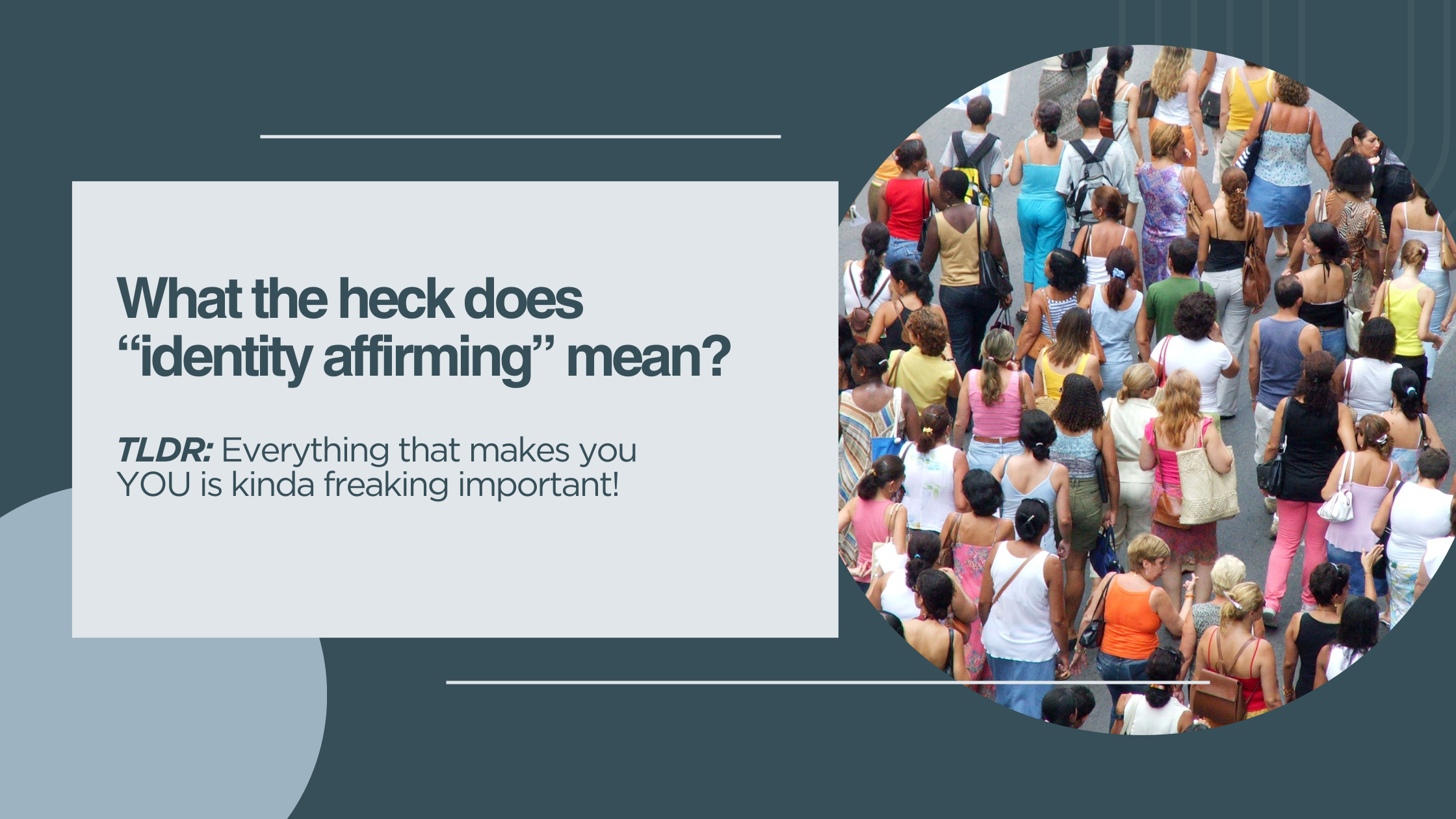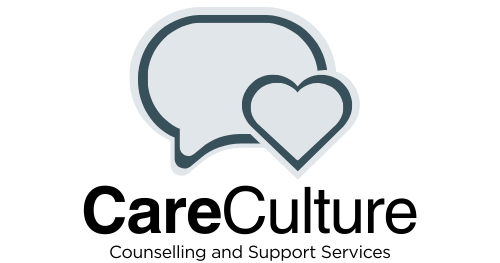
Allo folxs!
If you are reading this, WOW thanks! I’m taking on this fun experiment in verbalizing my ever-flowing thoughts, with the hopes that someone may find it helpful! So, if you read it through, let me know and maybe I’ll send you a gratitude postcard or something cool (did someone say stickers?)!
As my first post, I’m aiming to explain how I understand “identity affirming” within a counselling context but also in our overall lives. We often see these phrases or terms used in academic and professional settings that sound nice but can be too shy to ask what the heck it really means. So let me try and give a bit of a simple summary that can hopefully pique your curiosity. Let’s start at the basics!
Note for those who are familiar with the meaning of “identity affirming”: Thank you for joining in anyways! Feel free to add any info you feel I’m missing or comment to say hello!
What is “identity”? 
Simply put, identity is everything that makes you YOU! Your sense of self! It can be as simple as the way you say your name, the colour of your hair, or what you like to eat. It can also be parts of you that have a large social impact such as culture, religion, ability, spirituality, race, sexuality, gender, socioeconomic status, history, profession, family dynamic etc. Identity is all the glorious bits that make you an individual.
For some of us, there are terms that we use on a regular basis to describe our identity. For others, this may be a whole new world. There are TONS of ways to describe your identity, here are a few that folks may use:
- Black, Indigenous, Person of Colour (BIPOC)
- The global majority
- Racialized
- Melanated
- Equity Deserving
- 2-Spirited, lesbian, gay, bisexual, trans, queer, questioning, intersex, and more (2SLGBTQQI+)
- Disabled
- Able-Bodied
- Plus Size
- Neurodivergent
Now each of these terms have in depth meanings with histories that have popularized their use. While we won’t go into depth here as to each of their meanings, it is important to understand that it really is up to each individual person to choose the terminology that they feel the most comfortable with. You may even find that some folks who may seem to belong to the same identity group use different terminology to describe themselves.
Why does everyone have to make a big deal about their identity anyway?
I often hear “I just see people as people, I don’t care what your identity is.” or the most endearing “Stop being a snowflake. You’re just human like the rest of us.” While that human part is true (mostly), the reality is that we are all kinda our own special snowflake. Very few people share the exact same identity traits as someone else. But why does it matter?
A strong sense of identity that has been acknowledge and respected has links to better mental health. As shocking as it may sound, not every human is given the same acknowledgement and respect. When you are surrounded by a world that wasn’t made for people like you, it can lead to mistreatment, shame, guilt, and isolation.
Let me help paint a picture of what I mean. Does this describe your experiences:
- Most of your teachers looked like you growing up.
- Most of the shows you watched had characters like you, with relationships like the ones you were interested in.
- Most of the mental and physical health care professionals you have met look like you.
- Most of your bosses looked like and the people interviewing you too.
- Most of the people you had to interact with growing up spoke your language.
- You were able to get to and from school without any unique tools or supports.
If you answered yes to most of those things, chances are that you rarely had to:
- Explain why your name, skin colour, hair texture, accent, food, or movements sounded, looked, smelled, or felt a certain way.
- Explain why your tone was “aggressive”, “loud”, “rude” in passionate conversation.
- Hide your family, partner, or love interests.
- Explain why your family, celebrations, traditions, or beliefs were “different”, “odd”, “funny”, or “weird”.
- Beg for your basic needs to be met in order to be able to live like other people.
While lack of representation, explaining yourself, and hiding parts of yourself may seem like just a minor inconvenience, the constant feelings of shame, guilt, embarrassment, and fear can take a toll on a person’s mental health. Unfortunately, the examples I shared are really only scratching the surface of the realities people who are “different” have face in their daily lives. The things that have made them “different” are often met with threats of physical harm, lack of safety, and opportunities. (There is a whole lot to say about injustice, but I am going to keep this as an intro post. I’m hoping to go deeper into these topics as time goes on.)
Being able to proudly display and share your identity can be an act of self-love, advocacy, solidarity, and resistance to the past and present harm that people who are “different” face. It can also be a signal to others that you value and understand the way identities impact experiences.
Ok I get that, but why can’t I just treat everyone the same?
I mean, you totally can…. IF by the same you mean you are willing to treat everyone the way they want to be treated.
Some people want to be able to have their identities celebrated. Some people want you to acknowledge their identities, because it has shaped the way they experience and view life. Some people feel that their identity isn’t something that they feel needs to be shared with anyone but themselves. All of that is ok.
Our role in creating identity affirming spaces is allowing people to decide how and if they chose to share their identity and respond in the ways that make them feel respected and safe. It means knowing that folks with diverse identities will be accessing your space, so doing the things that acknowledge their existence and foster belonging (more on that in another post).
So, what does counselling have to do with “identity affirmation”?
Identity affirming counselling is support that promotes all intersectional parts of your identity in the ways in which you choose to share them. It creates a space where you are allowed to be you, without feeling the need to fit into societies created visions of “ideal”, “normal”, or “right”. It contextualizes your story, as your identity can play a huge role in how you experience life.
Ways in which I aim to provide identity affirming counselling are:
- You decide what you share and how you share it. I don’t force you to identify or share anything about what makes you you, unless or until you feel ready to do so.
- I don’t make you spend all your session explaining what an acronym means or the historical significance of your identity. It is my responsibility to do the work and keep informed and aware of aspects of identity, their history, and the way society is impacting certain communities.
- I recognize how your experiences are far more than just one offs by contextualizing how societal norms impact different communities.
- While I make it my goal to stay informed, I won’t loop you into a box of what this or that identity is. While some communities have their own shared experiences, you are YOU. Your experiences are unique, multi-faceted and deserve recognition and respect.
- I don’t make it ALL about your identity. If you want to come in and talk about something that has absolutely nothing to do with your identity, I will respect that. I will hold the space for whatever you need in your session.
I try my best to be informed, responsive, and empathetic. I may not always get it right, but golly do I try and create that safety!
My goal is to honour your humanity, in the way that makes you feel truly understood. I am here to make sure you know that you should do you, boo! No guilt. No shame. No judgment.
I’m honestly not sure why I am reading this blog. Is there anything you want me to do?
Well thanks for sticking around! There are tons of things you can do, whether you are looking for identity affirming counselling or trying to create a space that is identity affirming. Here are just a few:
- Learn! The world is giant and has tons of beautiful experiences. Don’t feel like you identify with any of the few identities I listed above? Well why not pick a few and learn about the terms, follow folks on social media with those identities, watch movies and shows that have characters with identities different than your own. Humbly bring your learnings into spaces where you have influence. And humbly prepare yourself to make mistakes. We all do.
Important note: Please do not ask someone to explain their identity to you. It is not their job. You may hear someone share their pronouns, something about their race, their disability, anything about themselves that you don’t understand. Your job is to recognize what they’ve shared and respect them as a human. If you don’t know what something means, use your curiosity to do some research. If by chance they open the conversation saying that they are open to share and answer questions, value and respect that opportunity. But don’t expect it from everyone.
- Connect! If you are looking for a counselling space where your identity is valued, let’s connect. If you’re looking for learning opportunities on topics like this for your classroom, organization, business, or community, let’s connect. If you are someone who is wanting to learn but feels that doing it solo isn’t for you, let’s connect. If this really didn’t make any sense and you truly care about understanding, let’s connect. Have feedback for me, let’s connect.
- Be your beautiful, extraordinary, unique self! Ok now that feels super fluffy, but what would a blog on a counselling site be without a little pizzaz! But really, if you are in a safe space where you can be yourself, DO IT! If you aren’t (which many of us aren’t), know that you are incredible. Keep yourself safe, find your people (even if that means only online), and find the micro ways where you can still honour yourself.
In Conclusion: I love you, you’re awesome.
This was a tiny snippet on what identity affirming counselling means to me and how I hope to foster that in my work. Like you, I am also human (get out bots). So, I am always learning and growing. If you’ve seen something that doesn’t sit well, let me know. I am always willing to learn, grow, and connect.
With care and connection,
Olga
P.S. If you did end up reading all the way, congratulations! I wasn’t lying about the postcard.
